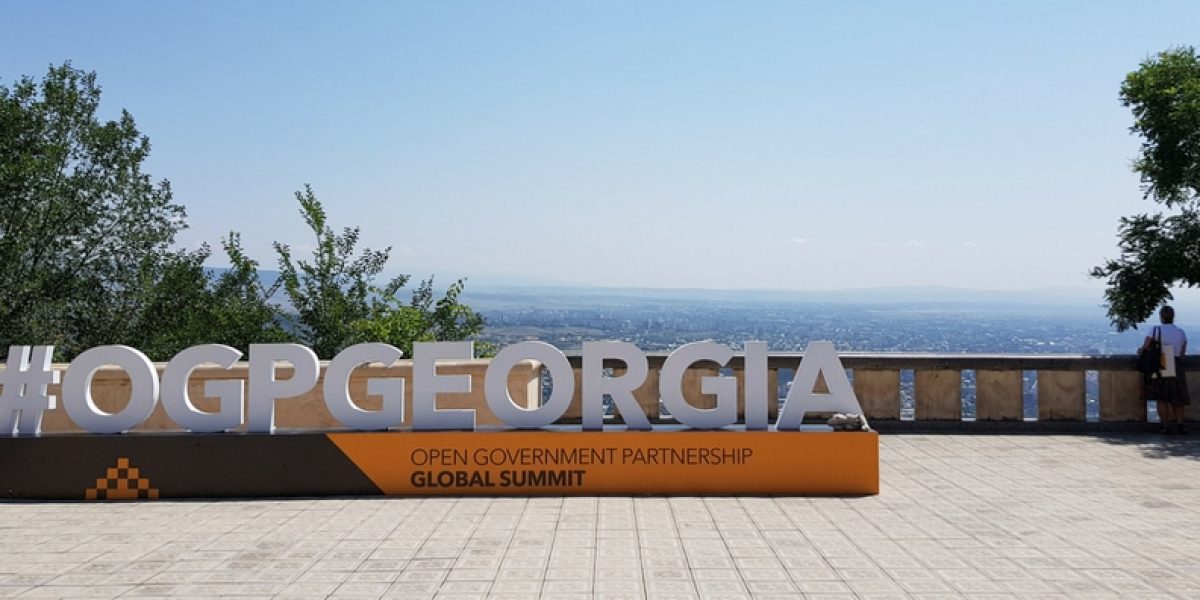Over 2,000 representatives of civil society, government and the tech community from 70 countries gathered in a park on top of Mount Mtatsminda, overlooking Tbilisi, the sunny capital of Georgia, from 18 to 19 July. They met to discuss global, national and local achievements and challenges in upholding the principles of governance, transparency and accountability during the 5th Open Government Partnership (OGP) Global Summit. Why is the OGP important in a world increasingly characterised by illiberalism and authoritarianism?
In his keynote address at the Summit, OGP CEO Sanjay Pradhan stressed that civic space – the concept of citizens being able to organise, freely discuss socio-political issues and attempt to influence them – is diminishing globally.
Global indices support his claim. According to the Economist Intelligence Unit’s Democracy Index for 2017, 89 of 167 countries studied saw their democratic scores decline from the previous year. Less than 5% of the world’s population lives in ‘full democracies’. The Civicus State of Civil Society 2018 Report asserts that 109 countries have ‘closed, repressed or obstructed civic space’, and only 4% of the global population lives in ‘open’ societies.
Yet Pradhan also highlighted numerous positive, concrete achievements notched up by OGP members. Armenia and South Korea removed leaders mired in corruption. In Mongolia, village audits saved 10% of the budget. In Nigeria, citizens provide feedback to local government on infrastructure, such as hospitals and schools, sending photos and comments through a smartphone app. Chile and Ireland are monitoring lobbying to ensure no untoward influence. And in Ukraine, the Dozorro portal which monitors government tenders and reports violations in contracts, saved the taxpayers over U$1 billion.
The OGP was established in 2011 by eight founding member countries (Brazil, Indonesia, Mexico, Norway, the Philippines, South Africa, the United Kingdom and the United States) and nine civil society organisations (CSOs). Their intention was to advance the principles of open government, which include transparency, accessibility of information and officials, as well as effective public oversight, through increased partnerships between governments and civil society.
Interested countries undergo an assessment, and must achieve a score of 75% (validated by independent experts) or higher to be admitted to the club, across four criteria: fiscal transparency, access to information, income and asset disclosure and citizen engagement. Once a country becomes a member, its government and civil society need to jointly develop a National Action Plan (NAP). The spirit of ‘co-creation’ is emphasised at this stage; a NAP must be developed in an open and participatory multi-stakeholder process. Proposed reforms and identified commitments across five main areas – improving public services; increasing public integrity; more effectively managing public resources; creating safer communities; and increasing corporate accountability – must be concrete and measurable.
The OGP becomes increasingly important in the current global context, with its core concerns about opening governments, increasing civic space and giving citizens a voice in how their countries are run. Yet civil society, almost everywhere, faces increasing attacks and questioning of their agendas and motives. Many governments in Africa, Asia and Eastern Europe have recently passed laws limiting the funding civil society may receive from foreign sources and restricts the topics they may work on (effectively banning them from research and advocacy on democracy and human rights).
Intimidation tactics have also been employed, including arrests, tax investigations and confiscation of computers, often under dubious pretences.
However, OGP membership should not be seen as a panacea. Some members indeed promote reform alongside like-minded peers, but others stray off this path. According to Civicus, 11 OGP countries have restrictive civic space. Five new countries (Ecuador, Kyrgyz Republic, Morocco, Portugal and Senegal), some with patchy democratic records, recently announced their intention to join. Since the last Global Summit (Paris 2016) Hungary, Tanzania, and Turkey have exited the partnership, while Azerbaijan was made inactive (for closing civic space). One view is to keep errant countries in, as membership in bodies such as the OGP and the Extractive Industries Transparency Initiative (EITI) often represents the last remaining space for CSO engagement. Yet others commend the OGP for upholding its principles by suspending non-compliant countries. This sends out a message that the initiative is not a mere ‘checklist exercise’ and it requires instigating meaningful reforms and positive change.
Looking forward to the next Summit, in Ottawa, Canada in May 2019, Pradhan spoke of the need to show an alternative path to governance, which empowers and puts citizens first. Through the increased use of technology, governments need to respond to concerns their citizens raise. Finally, more leaders need to speak in favour of democracy, defending it against being undermined by the proponents of authoritarianism and nationalism. In the meantime, the OGP remains an important tool to promote democracy and a global one at that.
For more on SAIIA’s work on the OGP and other Multi-Stakeholder Initiatives, including the African Peer Review Mechanism (APRM) and the Extractive Industries Transparency Initiative (EITI), please see our latest research papers:
- Multi-Stakeholder Initiatives: Lessons Learned
- Multi-Stakeholder Initiatives: What Have We Learned? An Overview and Literature Review
- Civil Society Participation in the Open Government Partnership (OGP)
- Multi-Stakeholder Initiatives in Africa – Case Studies of the African Peer Review Mechanism (APRM), Open Government Partnership (OGP) and the Extractive Industries Transparency Initiative (EITI) in Ghana, Liberia, Sierra Leone and Tanzania
- Peer Pressure and Peer Learning in Multi-Stakeholder Initiatives
- Multi-Stakeholder Initiatives and the Media








